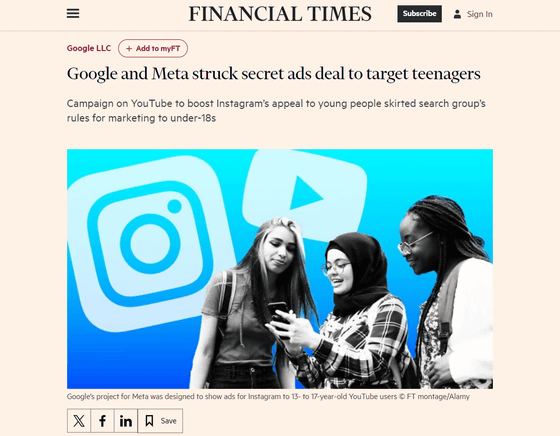Google and Meta reportedly signed secret advertising deal to target teenagers

The Financial Times has reported that Google and Meta have worked out a secret agreement to circumvent policies on the online treatment of minors and target Instagram ads to teenagers who watch YouTube.
Google and Meta struck secret ads deal to target teenagers
https://www.ft.com/content/b3bb80f4-4e01-4ce6-8358-f4f8638790f8

Google reportedly teamed up with Meta to skirt its own ad exploitation safeguards for teens
https://www.androidpolice.com/google-meta-targeted-teens-for-instagram-ad-campaign-per-report/
Meta and Google secretly targeted minors on YouTube with Instagram ads - The Verge
https://www.theverge.com/2024/8/8/24215911/meta-google-secretly-targeted-minors-youtube-instagram-ads
According to internal documents obtained by the Financial Times, Google intentionally targeted a group of users classified as 'unknown' in its advertising system, conducting an experiment to target teenagers with Instagram ads between February and May 2024. Many of the users classified as 'unknown' had unknown ages, but in fact many of them were minors.
Google hopes to use the experiment to develop a larger advertising partnership with Meta, which is aimed at attracting and retaining younger users against competitors like TikTok, the Financial Times reported.
The intermediary between Google and Meta was Spark Foundry, a US subsidiary of Publicis, a major French advertising agency, and the targeted advertising experiment was conducted in Canada from February to April 2024 and in the US in May.
The project was carried out on a small scale because it was merely an experiment, but the results were so positive that there were plans to expand it to international markets and promote other apps, such as Facebook.

The Financial Times claims that Google used the 'unknown' user category to circumvent its own internal policies, pointing out that it 'ignores Google's policies that prohibit personalizing or targeting ads to users under the age of 18, including serving ads based on demographics. Google also has policies that prohibit circumventing its own guidelines.'
When the Financial Times contacted Google, the company immediately launched an internal investigation, which resulted in the project being discontinued. Google responded by saying, 'We prohibit personalized advertising to people under the age of 18. This policy is supported by technical safeguards and we have verified that it worked properly,' and that users under the age of 18 were not subject to ad targeting.
Meta said it did not agree that targeting users of the 'unknown' app constituted policy evasion and that it would comply with not only its own policies but also those of other companies when advertising its own services. However, Meta did not respond to a question from the Financial Times about whether it was aware that the 'unknown' app's user group contained many users under the age of 18.
'Regulators are likely to bring new cases on charges of anti-competitive collusion, deceptive advertising, and targeting of minors,' said Android Police, an IT news site, pointing out that the secret contracts could be subject to crackdowns.
In February 2024, when this experiment was allegedly taking place, Meta CEO Mark Zuckerberg was summoned to a public hearing and apologized to the children and their families who had been driven to suicide by social media.
The CEOs of X (formerly Twitter), TikTok, Snap, Discord, and Meta are summoned to a public hearing on child safety on social media, and Meta CEO Mark Zuckerberg apologizes to children and their families harmed by social media - GIGAZINE

Related Posts:
in Web Service, Posted by log1i_yk






